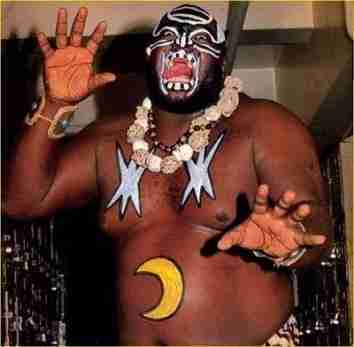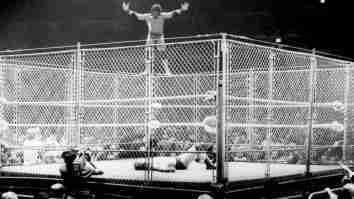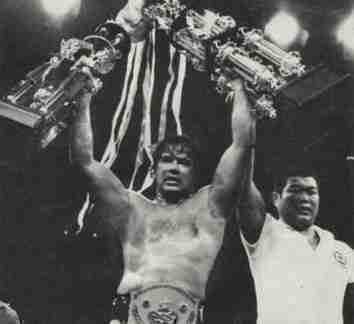Interviews (37)
Interview with Steve Lott
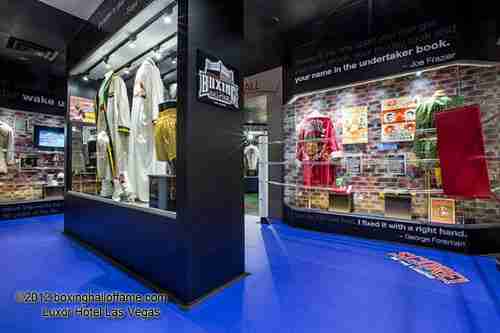 Speaking with Steve was like sitting under the learning tree of the sweet science. A historian of the sport and disciple of Jim Jacobs, Steve spoke to me about the long struggle to use their vast Boxing film library and create a Hall of Fame that celebrated just the fighters, and not the ones behind the scenes.
Speaking with Steve was like sitting under the learning tree of the sweet science. A historian of the sport and disciple of Jim Jacobs, Steve spoke to me about the long struggle to use their vast Boxing film library and create a Hall of Fame that celebrated just the fighters, and not the ones behind the scenes.Opening as part of Score, a sport themed attraction at the Luxor Hotel in the Las Vegas Strip in 2012, Steve Lott has created just that, a vibrant exhibit utilizing the historical and priceless film archive and embracing the modern social media to push his product. This differentiates this Hall of Fame from all of the other Boxing related Halls and uses every square inch they are given in Boxing’s prime real estate.
We spoke about the long path to the creation of his Boxing Hall of Fame, his personal relationship with former Heavyweight Champion, Mike Tyson, and the state of Boxing itself and how he views its past, present and future.
Interview with Terry Cummings
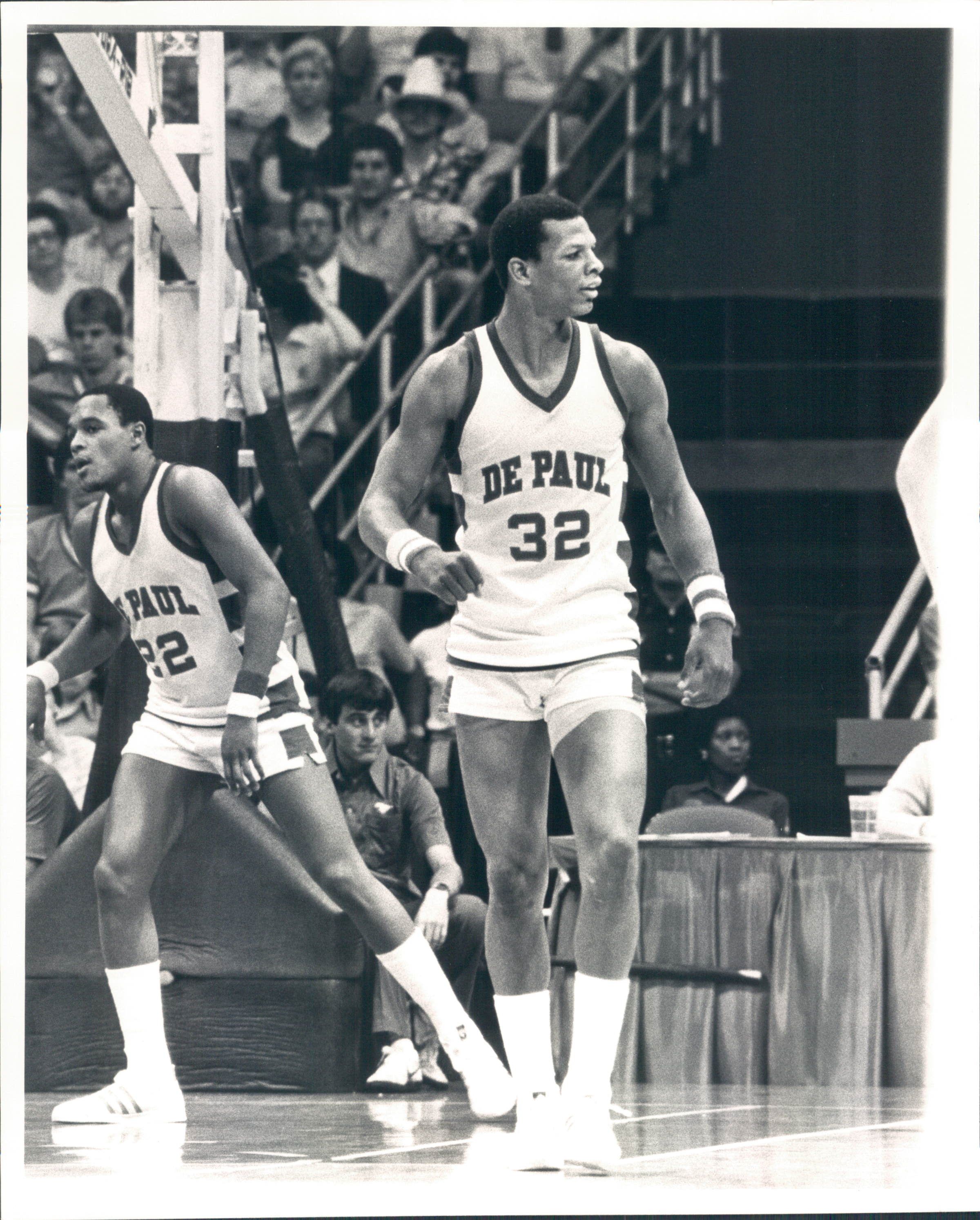 It isn’t that I don’t love talking about statistics and moments, as I certainly do, and a good chunk of this website is dedicated to looking at just that, but discussing how an athlete evolves in their life in ways that don’t reflect on a stat sheet is often the greater story. Once that story finishes, the transition from “athlete to civilian” can prove to be the greatest challenge that any athlete, especially a superstar in their profession can face.
It isn’t that I don’t love talking about statistics and moments, as I certainly do, and a good chunk of this website is dedicated to looking at just that, but discussing how an athlete evolves in their life in ways that don’t reflect on a stat sheet is often the greater story. Once that story finishes, the transition from “athlete to civilian” can prove to be the greatest challenge that any athlete, especially a superstar in their profession can face. Still, I have always despised the perception that all athletes are one-dimensional beings with the inability to think of anything other than themselves or their chosen sport. More often than not, that is the perception that we thrust upon them, and as it is their athletic exploits that garner the most press, and often their only press. This is not necessarily wrong, as that is their job and what put them in the public eye in the first place but when I had the opportunity to talk to one of Basketball’s true renaissance men, there was no way I was only going to chat with him about what he only did on a basketball court.
Interview with Mike Litherland from the "Induct Janet Jackson to the Rock and Roll Hall of Fame" Campaign
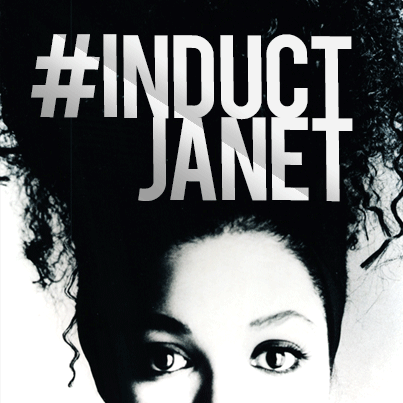 With that in mind, we thought it would be fun to conduct a series of interviews with individuals who are conducting online campaigns to get their respective artist/athlete inducted to the Hall of Fame.
With that in mind, we thought it would be fun to conduct a series of interviews with individuals who are conducting online campaigns to get their respective artist/athlete inducted to the Hall of Fame. The first person we reached out to was Mike Litherland, from Atlanta, Georgia, who operates the Induct Janet Jackson to the Rock and Roll Hall of Fame campaign. It has a very active Facebook page, holding a sizable near 14,000 Likes.
Janet Jackson has been eligible for the Rock and Roll Hall of Fame since 2007, and a case could be made that she was the biggest female singing star in the world at one point in time. Jackson ruled Pop and R&B airwaves for fifteen years, and while casual music fans may not view her as influential, music history has shown that a large amount of Janet clones existed and she was a seamless bridge from Pop to R&B in a way that few could match.
We asked Mike a few questions about his push to induct Janet Jackson to the Rock and Roll Hall of Fame.
On a personal level, what first attracted you to Janet Jackson's music, and what you say is her essential album for someone not familiar with her work to listen to?
“I first remember Janet from her appearances on Good Times. From a musical perspective, though, I remember when she performed ‘Young Love’ on American Bandstand. I was pretty young at the time, probably 11 or 12, but there was just something about her that stood out and made me take notice. I became a 'fan' when Control was released and she completely dominated the music world and the Pop, R&B and Dance charts. I remember hearing Janet all over the radio - and seeing her videos all over the place. I remember being obsessed with Friday Night Videos (on NBC, maybe?). They had a segment called Friday Night Video Fights and my siblings and I would call the 800 # to vote any time one of Janet's videos was in the battle. Those were good times. On MTV, Janet was one of the first African-American female artists to be placed in heavy rotation.
It's difficult to decide on one essential album. As a fan, I consider ‘The Velvet Rope’ to be her masterpiece. It's raw, powerful and very introspective and covers a lot of territory. A very, very close second would be Rhythm Nation 1814. It's quite possibly one of the most cohesive albums in history and would probably be the best pick to play for someone who isn't familiar with Janet's work. Both albums have been listed on Rolling Stone’s list of greatest all-time albums.”
What triggered you to want to try to get her inducted?
“I've enjoyed the Rock and Roll Hall of Fame for years and years. I grew up in Dayton, Ohio so I've actually been to the museum three or four times. I began following the nominations and inductions ten or so years ago. I had no idea how political and convoluted the nomination process is/was. I remember being surprised that Madonna was inducted after her first year of eligibility. Once that happened, though, it made Janet's nomination chances also appear to be a no-brainer. Janet's been eligible since 2007 and still hasn't even received a nomination yet, though. It's definitely a head-scratcher since Janet rivaled and matched her peers of that time (MJ, Prince, Madonna) and they've all been inducted. Janet broke a lot of records and doesn't always get the credit she deserves. I guess that's why I decided to get involved and created the Facebook page a little over a year ago.”
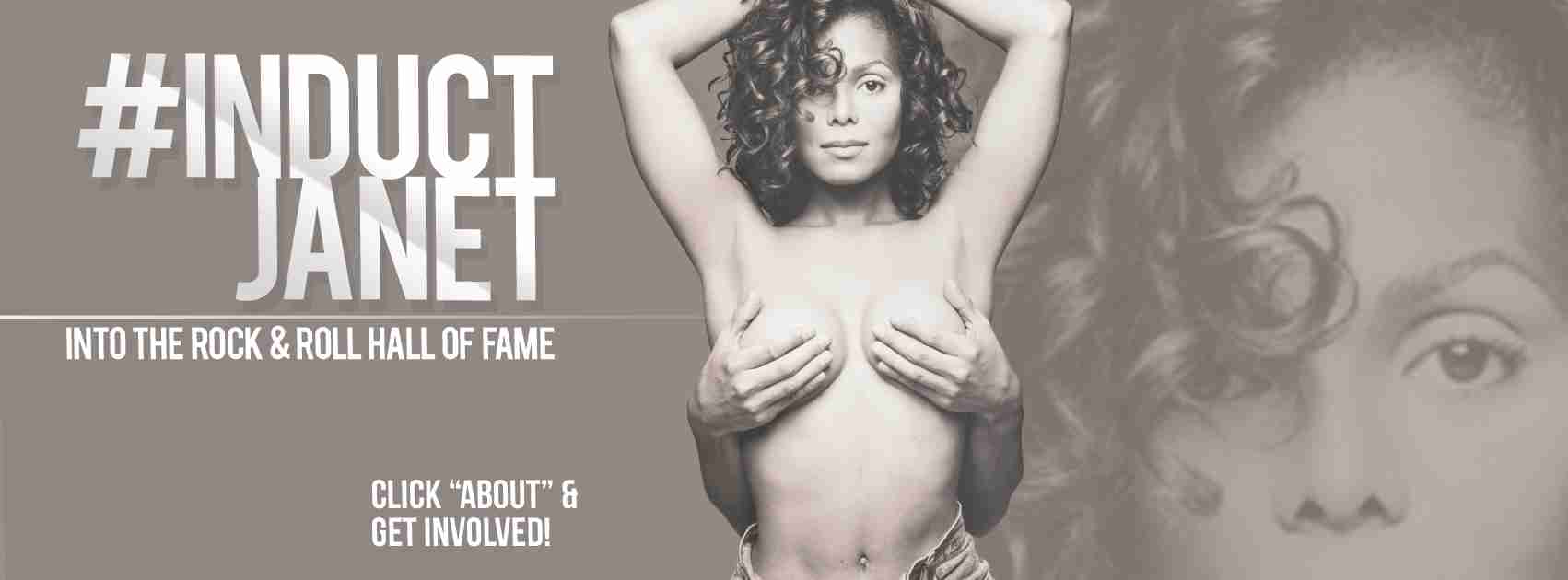 What are the main attributes that Janet has in her music that makes you feel she is a Hall of Famer?
What are the main attributes that Janet has in her music that makes you feel she is a Hall of Famer?“Janet was able to emerge out of her brother's shadow and even eclipse his popularity during the 90's. She's a very savvy businesswoman and her commercial success is undeniable. She was virtually unstoppable in the 80's and 90's. The Rhythm Nation World Tour in 1990 remains the biggest debut tour of any artist in music history.
The Nomination Committee doesn't factor commercial success into their nomination equation, though. The fact that Janet wrote, co-wrote and co-produced on all albums from 1986's Control through 2006's 20 Y.O. shows how involved she was in the creative process of all of those hit records and albums. That should make quite a statement.
Janet Jackson, Jimmy Jam & Terry Lewis created a magical dream team of sorts. Contrary to what some may believe, Janet Jackson was no puppet. She was in control, both literally and figuratively - and proved it with each release being more successful and having a bigger impact than its predecessor. Janet Jackson's music is the soundtrack of the 80's, 90's and 00's.
And then the 2004 Super Bowl performance happened, damaging her career & musical legacy…but we'll get to that in a bit.
Why do you think she has been ignored by the Hall, and not even nominated at this point?
“The fact that Janet hasn't released a new studio album since 2008 has probably hindered her chances a bit. She starred in several hit movies and had a very successful Number Ones Up Close & Personal tour, but has remained out of the spotlight of the public eye for several years now.
I also think there's a bias in the NomCom. It seems to be a very political process and decisions seem to be heavily influenced by a handful of the more persuasive members of the committee. And obviously, there's quite a backlog of deserving artists. At some point, though, they're going to have to add Janet to their nomination discussions. I'm just pushing to have that happen sooner rather than later.
Rumor has it that she's finishing new music now, so hopefully the dry spell is just about over. If the new album is even moderately successful that should also send quite a statement. To have such an incredibly successful career and still be doing it after 30+ years is pretty amazing…and shows tremendous longevity.”
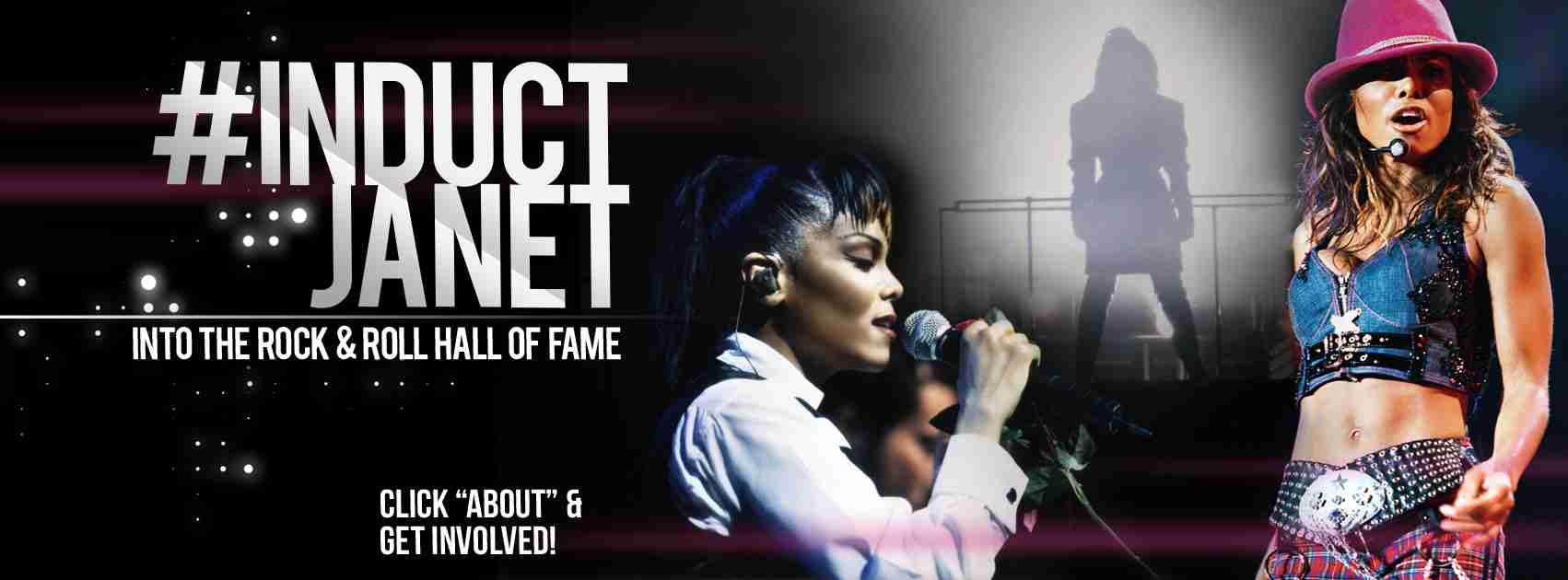 Do you think (serious question) that the Super Bowl Nipplegate affected her chances?
Do you think (serious question) that the Super Bowl Nipplegate affected her chances?“I won't spend a lot of energy on this question, but the Super Bowl fallout seriously damaged her career and I'm sure that's had an impact on her nomination chances. Should it have a negative impact on her nomination, though? I mean - what's more "Rock & Roll" than that?!?!
In all seriousness, though, I do wish someone could explain why Janet was completely blacklisted in the industry and destroyed by the media yet Justin Timberlake remains unscathed and more popular than ever. I'll leave it that.”
If Janet gets inducted, Is there another act that you feel passionate about getting inducted?
“I'd really like to see The Cure nominated again. I think The Smiths and Depeche Mode are also deserving. Other artists I'd support are: Joy Division/New Order, Bjork, and De La Soul off the top of my head. Other deserving artists that I hope to see nominated when they become eligible are PJ Harvey, Alanis Morissette and A Tribe Called Quest.”
We thank Mike for his time and we look forward to doing more of these type of pieces in the future.
You can like this page on Facebook at this link: https://www.facebook.com/InductJanetJacksonIntoTheRockRollHallOfFame
Or you can follow them on Twitter at @inductjanet
Interview with Stan Hansen
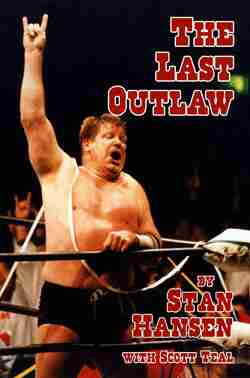 Then it came to me. This is a man whose matches I used to watch on VHS where he would barrel towards the ring, tobacco spilling out of mouth while swinging his bull rope occasionally hitting the fans. Time after time, that was how he would enter the ring and every time he talked the decibel level was at eleven. Unlike other wrestlers who would go through varying personas, this was the only Stan Hansen I remember seeing; one that I thought might be able to reach through the phone with his rope and hogtie me with it if I asked the wrong question.
Then it came to me. This is a man whose matches I used to watch on VHS where he would barrel towards the ring, tobacco spilling out of mouth while swinging his bull rope occasionally hitting the fans. Time after time, that was how he would enter the ring and every time he talked the decibel level was at eleven. Unlike other wrestlers who would go through varying personas, this was the only Stan Hansen I remember seeing; one that I thought might be able to reach through the phone with his rope and hogtie me with it if I asked the wrong question.As I do with all of my interview subjects I researched other interviews that they had done, though with Stan there were not that many. As Chavo Guerrero Sr. had told me[i] Stan was a private person and not one to open up easy, and the fact that there were not that many interviews around corroborated that.
Once I called Stan Hansen, I realized quickly that I was speaking with not only one of the nicest[ii] men I ever had the privilege of conversing with, and one of the most humble. Considering the vast accomplishments of Stan “The Lariat” Hansen, I was a little surprised by how much he downplayed the impact he had on the business.
Stan Hansen spent most of his career performing in front of a Japanese audience, accomplishing a bible’s worth of accomplishments, most notably winning the All-Japan Triple Crown Title Heavyweight Title four times, the All-Japan Unified Tag Team Championship eight times and won every major tournament that the promotion had to offer. Along with fellow American, Bruiser Brody, Hansen helped to usher in a more physical style that was not just based on strength and power moves, but where no lulls in action took place, and twenty minute matches would not feature rest holds put would be perpetual motion and power.
It was not that Hansen did not have major achievements in the United States. In 1977, he was in a main event program with Bruno Sammartino in the then named World Wide Wrestling Federation, and when the industry enjoyed its boom period in the mid 80’s, Hansen was the World Heavyweight Champion of the still relevant American Wrestling Association. Five years later, he had a six-month program in the NWA[iii] where he won the prestigious United States Championship from “The Total Package” Lex Luger.
The brain trust at both the WWF and WCW coveted Hansen and could have easily slotted Hansen into a main event program with whoever was their champion at the time and drew money. A Hansen VS Hulk Hogan series would have been entertaining[iv] as world the Texan against any of the other top draws the WWF or WCW had during that time period, and it is not that they neither top American promotion wouldn’t have grabbed him if he made himself available[v].
North American fans may have salivated over those possibilities, but could it have been as good as the matches we saw Hansen in against Mitsuharu Misawa, Jumbo Tsuruta or Kenta Kobashi? With wrestling fans engaging in tape trading in the 1990’s, Hansen’s Japanese legacy of elite matches was seen my hardcore fans, and with the creation of YouTube in 2006, Stan Hansen’s matches in Japan have found a whole new audience, and reminded older fans why the “Lariat” was one worth watching.
For about thirty minutes, I had the privilege of speaking with Stan Hansen about his autobiography, wrestling in Japan and his role in Hulk Hogan’s first starring role, No Holds Barred and his appearance in 2010, inducting Antonio Inoki to the WWE Hall of Fame.
I really enjoyed my conversation with Stan Hansen that I am able to share with all of you and I will treasure the time after the interview where Stan and I spoke about our mutual friend (Chavo Guerrero Sr.), life in the Rockies[vi] and life in general.
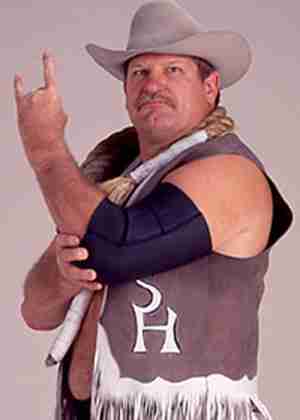 I want to first congratulate you on your autobiography (The Last Outlaw) that has recently come out. It has been getting some good reviews online, and has received an overall positive response.
I want to first congratulate you on your autobiography (The Last Outlaw) that has recently come out. It has been getting some good reviews online, and has received an overall positive response.“Through my publisher and through the people that I have actually talked to have read it; that being some of the old time wrestlers, they seemed very positive. That means a lot to me, and that’s the most important thing. I am glad that people have said some good things out there. I don’t know a lot of what they said, but I’m glad to hear it.”
A lot of the positive comments stemmed from your attention to detail and insight into the Japanese wrestling culture, which a lot of North American wrestling fans don’t know much about. It was nice to get a deeper insight into that world, beyond just the matches.
“Right. When I set out to write the book, I wanted to talk about the business there and the great characters. It’s not about the inner workings of the business, but about the great people that I met. That was the reason for the original book.”
As I understand, this wasn’t your first book, as you have an autobiography in Japan, right?
“That’s right. I expanded on this more, as the (English) language allows me to do much more.”
What has always fascinated me about your career is that as much as you wrestled most of your career in Japan, you still gained a sizable following in North America and so much of what you did here had an impact.
“You know, I don’t know if that’s because of word of mouth, or people just started seeing the tapes from Japan. I’m going to tell you why I did more in Japan. I just had some great opponents that people were interested in seeing me wrestle. You’re only as good as the person you’re in there with. I say that in the book, but it really is true. I had some awesome guys over two generations that were really great wrestlers. If people hold me to a high regard, a lot of is because of the guys I worked with to be honest.”
You have gone against anyone that ever mattered in Japan. I believe you are the only American to hold victories over Antonio Inoki and Giant Baba?[vii]
“I think I read that somewhere. I don’t know if someone else has or hasn’t.”
What has always also fascinated me about many of the wrestling stars from the 70’s and 80’s, more opposed to now, is just the incredible cardiovascular ability that you and many of your peers had. Many of the chiselled bodybuilder types couldn’t go in the ring as long as you could. What type of training regimen did you do to have that type of stamina?
“You know I’ve been called a lot of things and most of them are pretty bad but muscled isn’t one of them! (laughs) I come from a different age before it turned into more of a bodybuilding type physique. I come from the old football type mold where you fought in the trenches.[viii] In football, you run, you get pounded you pound other people, you get up and you do it again. For me it all started with Football, and I played Basketball and Baseball too. You had to go in the ring in Japan.
The specimens today, they put a lot of hard work, and it’s not all steroids, these guys are really dedicated. Why it changed, I don’t know, but I’m glad I’m from the old school.”
Would you say that you were not just built to be a wrestler, but a wrestler in Japan, as that style suited you more than anything else that was going on in the United States?
“I think I was one of the guys that helped change the styles in Japan. In the late 70’s it really started to change. There a lot of guys that I respect in Japan. It changed from ‘one tackle, drop down and do it again’ to something more aggressive. I would witness other people do that for short bursts, but I wanted to take that up a notch and keep going through the whole match. There were a lot of people who would end up doing that style or try to do that style, but it was hard. Physically, it’s hard to do day in and day out.”
Would it be safe to say that because that style was not really implored in the United States that you did not wrestle more here?
“Well, another reason I gravitated to Japan is that I got tired of fighting all the American promoters about money. In Japan, I knew what I was going to make, and I liked that. This was also before they (the WWE) handed out guaranteed contracts. In Japan I could budget myself because I knew I would make X amount of dollars. I could spend this much, and the rest of it I was going to save. I was in it to try to get ahead because I knew I couldn’t do it forever.”
I have always heard great things about Giant Baba[ix], and Chavo (Guerrero Sr.) has told me that he was a man of his word. I can imagine that when this is the type of man you are working for that you would not really want to work for anyone else.
“That’s a big part of it, but I have to say that (Antonio Inoki)[x] gave me the opportunity. He gave me that opportunity to get established in Japan. I went to Baba and wound up working for him for twenty five years. He (Baba) allowed me to continue the style (I was developing) and he wanted my style and wanted to promote that style. It ended up changing their business. It was great working for him and I really enjoyed it.”
I am sure you are asked about the WWE all the time and why you did not go there during the Hulk Hogan period, but I do want to compliment you on a small role you did with the company, when you were in the (WWF Produced) film, “No Holds Barred”. I am not trying to denigrate Hulk Hogan,[xi] but the film wasn’t that good, but you were great in it.
“Well, I didn’t have a big part. It’s funny, have you just seen it?”
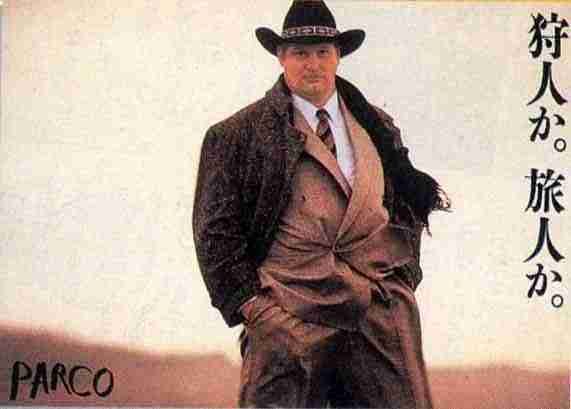 Not recently, but when I was doing additional research before calling you, I was reminded of it, and searched out your clip before I called you. What I found interesting though, is that you were in the film which was produced by the WWE, but you were not contracted with them. How did that come about?
Not recently, but when I was doing additional research before calling you, I was reminded of it, and searched out your clip before I called you. What I found interesting though, is that you were in the film which was produced by the WWE, but you were not contracted with them. How did that come about?“Vince Jr. told me that when he and Hogan were talking about it, and Hulk said ‘you know who could do this part? Stan Hansen’. That’s the reason I got it and I appreciate them thinking of me for it. I had never done a movie before and I had never done one since. It’s funny that you bring the movie up. When that movie came out I took my kids and their friends to see it in on a matinee in a theatre in Mississippi. There were about fifteen people there and we were ten of them and that was the only time I ever saw the movie, until recently when my wife found it online and ordered a tape of it. I forgot all about it; it was out of sight, out of mind.”
I remember a review from one of the wrestling magazines, and I can’t believe I remember this; but it spoke about the movie and praised you for being one of the only characters in the movie that didn’t stink.
“(Laughs) You mean physically stink?”
(Laughs) I believe it said you were a “natural and funny character”.
“All these years later I wonder what would have happened if I pursued being a character actor.”
Really?
“Yeah. There are so many things I couldn’t play, but if they wanted a goofy type of character I believe I could have done that, but those days are passed.”
Now that you bring it up, I think of every role that Terry Funk had in acting, you could have played. You would have made a great bouncer in Road House.[xii]
“Terry ended up doing a lot of movies. He ran with that a little bit. I think that’s good.”
I think that another thing you should be praised on is that when you walked away from in ring wrestling, you walked away for good. So many other wrestlers came back after they retired or just so many athletes in general. You strike me as someone who once you ended your career decided that you were done, and moved on with your life and never looked back. Was retiring from the ring hard for you, or were you ready to move on?
“It really wasn’t hard. It has been hard to convince people that I am finished though. I thought long and hard and I had a standard that I wanted to try and maintain. I had seen so many guys retire and come back, and retire and come back. I told myself that when the time is right I would retire and not do that.
When I felt the physical limitations of my body, I decided that was it. I had a match in Japan and felt that like I couldn’t do what I used to. I had a couple of more matches after to finish the tour out, but I knew that was it”
Also it appears that you do not define yourself as a former wrestler, and so many of your peers haven’t been able to do that.
“Another thing is that they had a retirement ceremony for me in Tokyo during a wrestling show. They made a huge deal out of it. Mrs. Baba[xiii] promoted my retirement and gave me a great retirement program, not just for the wrestling card but there was a week of events. I had my whole family there and she treated me with great respect and all the Japanese people poured out to show their respect.
I never took myself super serious, but they made me realize that they did see something in me, and it was really humbling for me. I could never ever insult those people by coming back and wrestling. I was physically ready anyway and I had done all I could do.”
It is safe to say that you are Stan Hansen; “Husband and Father” now?
“(Laughs) I appreciate all the fans, I do, I still go to Japan from time to time and they (New Japan) still bring me for special events and I like that. I don’t miss the wrestling, or the limelight. But now that I’m sixty-four years old, and time is clicking. It’s time to go back and reconnect with the fans in some way, because when I was wrestling I was not one to be connected to the fans. It was a business. When I got through wrestling I went back to Colorado or Texas and spent time with my family. Nobody knew me as anything else but someone’s dad, and I liked that.
As I’ve grown older and I am reconnecting with the fans and it feels good to hear that people have good thoughts about me, but to be honest, I don’t miss the wrestling at all.”
I imagine your body doesn’t miss it either!
“(Laughs) That’s true. I got four artificial joints and probably need a couple more. Anyway, I feel OK though.”
In 2010, you inducted Antonio Inoki to the WWE Hall of Fame.
“Right”
How did that process come about? Did Antonio contact you, or were you contacted by the WWE?
“I can’t remember exactly who contacted me, but I believe that Inoki asked for me. Maybe they gave him a couple of choices; I don’t know, but I am sure he had something to do with it.”
With your Japanese legacy, you were a great choice to induct him.
“I was really happy to do that. That was the first time that I had ever been around the WWE since Vince Jr. took over. I must say that I was unbelievably impressed with the organization; it blew me away. They run a great organization whether you like their style or not.
I worked for Vince Sr.[xiv] and Vince Jr. was there. Business wise, you never get along one hundred percent with people, but I have nothing negative to say about Vince Jr. They have taken wrestling and evolved it. Everything changes. I’m old school and I’m proud of that but that doesn’t mean that I have anything negative this new type of wrestling. They are great athletes. I don’t watch it, but you can’t help but see that these guys are in great shape.”
You yourself are a member of the Professional Wrestling Hall of Fame.[xv] How did you feel being selected for that?
“I felt really good about that. It is done by your peers. Your peers have to nominate you and they have to vote on it. I was honoured to be chosen. The WWE has their Hall of Fame, and their other Halls of Fame[xvi] out there, but this one is done by my peers and it means a lot to me.”
[i] Chavo, who has become not only a great friend to the website but also a personal one, facilitated this interview.
[ii] Stan spoke to me about he never wanted to bury anyone in an interview. He also spoke about he lives up to the expression, if you don’t have anything nice to say, don’t say anything philosophy. Conversely, finding anyone who says anything bad about Stan Hansen is next to impossible also.
[iii] This was in the year before the NWA become WCW (World Championship Wrestling)
[iv] That match did happen in Japan. It should also be noted that Hulk Hogan and Stan Hansen are friends.
[v] Or How about Stan Hansen VS Sting in WCW or the Undertaker in the WWF. Both would have been huge money and unique programs.
[vi] I live in the Canadian Rockies, and Stan has a home in by the Colorado Rockies. We both have a lot of experience with wild elk crossing our homes!
[vii] Putting that in an American context, it is like holding a victory against Hulk Hogan and Andre the Giant
[viii] Hansen played Collegiate Football at West Texas State.
[ix] Baba owned All-Japan Professional Wrestling, which is where Stan wrestled the majority of his matches in Japan for.
[x] Inoki ran the All-Japan rival, New Japan Pro Wrestling. Both All-Japan and New Japan remain the top two wrestling organizations in Japan today.
[xi] Personally, it is one of those guilty pleasure films. The last time I stumbled across it on cable, (which was years ago) I dropped what I was doing to watch it. When the WWE rereleased it on DVD a few years ago, they acknowledged the cheese factor that the film has.
[xii] Talk about the ultimate guilty pleasure movie! Picturing Stan Hansen telling Patrick Swayze “If you don’t start drinking you’re out of here!” is not hard to imagine. Funk was also in Sylvester Stallone’s arm wrestling film, “Over the Top”.
[xiii] Stan retired in 2000. Giant Baba passed away the year before, and All –Japan was owned by his widow, Motoko Baba.
[xiv] Stan had a high level program against Bruno Sammartino against the then named WWWF culminating in a match at Shea Stadium which had an attendance of 32,000.
[xv] He was inducted in 2010 in the Modern Era category.
[xvi] In 1996, Stan was also selected to the Wrestling Observer Hall of Fame.
Steve Cox
Steve may have also been one of the funniest people I have had the pleasure to talk to. As i listened back to his stories in his distinctive Midwestern drawl, the amount of times I found myself bursting out laughing eclipsed any other interview I have ever done.[i]
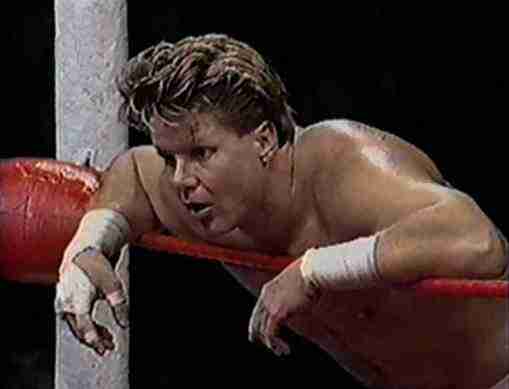 I found the timing to be perfect. Currently, the WWE is promoting a Mid-South wrestling DVD, and though Cox did not officially compete there, he was there in final portion of Mid-South’s finale, the UWF. Cox may not have been the biggest name in the business, but he did compete against and befriend those who were. He also was an amateur wrestler who would later compete in the early shoot promotions in Japan, which itself would foreshadow the Mixed Martial Arts that has become popular now.
I found the timing to be perfect. Currently, the WWE is promoting a Mid-South wrestling DVD, and though Cox did not officially compete there, he was there in final portion of Mid-South’s finale, the UWF. Cox may not have been the biggest name in the business, but he did compete against and befriend those who were. He also was an amateur wrestler who would later compete in the early shoot promotions in Japan, which itself would foreshadow the Mixed Martial Arts that has become popular now. With special thanks to our mutual friend, Chavo Guerrero Sr., I hope you enjoy the transcript of my chat with Steve Cox.
You had a great football career at the University of Tulsa, correct?
“I grew up out in the middle of nowhere, three miles across into Kansas, and I was a real good Linebacker and wrestler and I got a full ride scholarship to Tulsa University. That’s how I got there.”
This took you to the USFL right?
“Yeah, I got out of school and then I got drafted.[ii] I was signed by the New Jersey Generals and was there when Herschel Walker came in. I am going to show my age, but this was back when ESPN was showing us and we were a bunch of lunkheads wondering who would watch 24 hours of sports. This was the early days of (Chris) Berman. Chuck Fairbanks was our Coach.[iii]
I was traded from to the Michigan Panthers[iv] so I went from Hackensack, New Jersey to Pontiac, Michigan and Jim Stanley was our coach. He was one of the original guys who went off with Bear Bryant at Texas A&M. He was a real hardcore coach. Anyway, I was getting beat up pretty badly, and I decided to get out (of Football).”
You mentioned that you were an amateur wrestler in school. Were you a fan of pro wrestling when you were growing up?
Heck no! Now I grew up in Kansas, so I was familiar with Bob Geigel and Harley Race and all those guys. Every now and then we caught a glimpse of the old WWF out of New York. But as a collegiate wrestler, though this has changed since Kurt Angle, a lot of the “real” wrestlers didn’t appreciate “fake” wrestling.
As I got out of the USFL, and back in the day there weren’t a lot of gyms, and I always went to Moguin’s Gym by TU (Tulsa University). When the wrestlers came through, that’s where they worked out. I was actually talking to of all people, Sting[v] and he asked me if I ever thought about being a pro wrestler, and I said ‘not really’. That weekend there was an article in the paper about the UWF, Bill Watts and the Rock and Roll Express and how they had a sold out crowd downtown. The guy who owned the gym was a friend of Bill Watts and he called him up and I met Bill Watts.[vi]
I didn’t realize at the time what Bill was all about. He asked me if I had (wrestling) boots and I said no. He said I had no possibility in hell until I go t some boots as he couldn’t get me in the ring and do much with me. He said, stay and watch the show, and they did TV every Sunday night in Tulsa and that place was sold out like lightning.
I got some boots in this place out of Arkansas. Back in the day, there weren’t too many places you could buy (wrestling) boots unlike now where you can buy them all over the place. Anyway, I got my boots and I got my trunks and I got a call that he wanted me at the arena at four o’clock, which was pretty early because they started at seven. I get there, and he (Watts) says suit up, and I go out to the ring. We’re in the middle of the ring and Watts says ‘Hit the ropes’, and I’m running back and forth hitting the ropes. He said ‘Drop down, hit the ropes. Drop down, hit the ropes’, then he says be at my house, which was near Tulsa at two o’clock Sunday.
I got to his house and we drove to Miami, Oklahoma and we go to this armory and he said you’re going to wrestle tonight. I’m like ‘Oh Shit, I’m not planning on it!’, but I get to the arena and there is Terry Taylor, Rick Steiner, Doc (Steve Williams) and my first match is with Mike George.
It was a small armory, but this place was packed to the ceiling with people. I go out there and Mike George[vii] is my first match and Tommy Gilbert is the referee. I should have known from the first match when I went over that I was being brought in as Dr. Death’s protégé, but I had never took a bump. Mike was slamming me, giving me boots, but Tommy was getting in my ear that ‘we have a superstar here!’ I couldn’t even breathe during the match! Mike did the deal where I grabbed the ropes and he falls back and then 123 kick and I take a powder and I am beat to shit.
After, Terry Taylor says ‘Now why would Watts want a jabroni[viii] to get ahead?’ you know what I’m saying? They’re all inquisitive and watching ‘cause Watts liked big men. That’s why he used to crack on the Memphis territory, and how you had to put over midgets[ix]. Watts wanted you to understand that you had to bump for the right people at the right time.
That night, there was (Skandor) Akbar from Devastation Incorporated[x] , The One Man Gang, Eli the Eliminator and Bill said to me that I can’t to a Stampede run[xi] which was Doc’s finisher so I was told to do a Side Russian Leg Sweep for my finish. I think Bill Irwin came up with that. The deal that night was that I would go watch Doc have a match with Mike George which was a technical match. Doc goes over and Devastation runs in, and I jump in. Now, I don’t know shit about the business, that’s how green I was. After that, every night I was working and every night I was getting killed in the ring. I was getting crowbarred, the old school way. There wasn’t a lot of wrestling schools; that was my school, right there.
They came up with an angle where I would be the Rookie of the Year. My first marriage[xii] was really against Gary Young. He really cleaned me up pretty good. Every night we did the same match, but it was always different. I don’t know if you heard some of the boys say this, but (Ric) Flair’s match was always the same but they are always different.[xiii] The boys knew how to tell the difference.
At the time I was fortunate enough to run around with the top guys and I kept my mouth shut, and I learned a lot. I had my first ever squash match, I put over Bubba (Rogers) real good; Watts loved that; which helped Doc when he went in to help. The thing about Watts is that he told me a lot of stuff that didn’t make sense at the time, but it helped me later on to see the business as not just as worker but as a promoter.”
Did you get some heat with the boys because you came in with a decent position, especially since you did not have a professional wrestling background?
“Oh yeah. I was brought in, green as green could be and at the time Bill Watts was negotiating with the NWA[xiv] . We were working tight every night. Now when they would come at me, and I’m not the sharpest guy on the stick but when we got to a certain point, I was like ‘Fuck You’, and I would stand up (for myself). Like I said, I was a real good High School athlete, I wrestled, I played Football, I could slow them down. But I had to respect the fact I was crowbarred in, and it wasn’t easy for them to take that. I understood. Nowadays (aspiring wrestlers) go to school; real boy band shit. In my day it wasn’t that way. You had to be one mean, tough son of a bitch to get through this shit! Staring out the way I was (with a good spot), it just wasn’t done that way.
I remember Terry Taylor, he had to lace up my boots[xv] . Terry said ‘Look at this fucking guy!’. It was hilarious. Chavo (Guerrero Sr.) of all people showed me how to tuck in my laces. That’s how bad I was, I didn’t know how to lace up boots. These guys would thump me pretty good, because I couldn’t lace up boots. If I couldn’t do that, why would they want give me anything (in the ring)? “
Was there anyone who took you under their wing when you were starting out?
Yeah, Chavo. He was the most consummate worker, he understands the business, and he grew up in the business. Everything he did (in the ring) had meaning. He was the total package, and he was one hell of a partier! Sometimes he would go too far out there, and you would have to reel him back in, but that was Chavo!
I had Gary Young, I had Doc, and Terry Gordy. I would ask them to watch my matches and have them critique it. This is another way that Watts helped me; he said when they tell you what to do, don’t say ‘Yeah, but’. They don’t care what you’re thinking. Listen to what they’re telling you. They will check to see if you listened, and from there you will get more information.
I just lived, learned and watched. I rode with everyone from Flair, Arn Anderson and really everyone. You have to realize that in my first year to two years in the business I had almost five hundred matches. I was dong singles and tags often on the same card, and as a new guy that was the norm.
One night, me and Sting after (Ultimate) Warrior left[xvi] I pained my face and worked with him as his partner against (Rick) Steiner and somebody else. Jeff Gaylord, I think. Think about it, these indy kids nowadays wouldn’t be working with the best in the business in their first five hundred matches. That doesn’t happen anymore. The work was tough. We weren’t just suspending disbelief, we were really tough. In time, I could work 60’s style, 70’s style, 80’s style, 90’s style, Bullrope Match, two minute match, six minute match; whatever.
The most important match is the opening match. A lot of green guys don’t even know that. The opener sets the tempo and the crowd. It is not an easy match, usually fifteen minutes and a time limit draw; a lot of false finishes. These kids today don’t know; you don’t get that anymore.”
You were there when the NWA merged with the UWF. Chavo Guerrero told me that he didn’t see it coming, and that it was a surprise to him. Was it a surprise to you also?
“A lot of people thought something was up. Now I didn’t really, because I was just happy to be in the same locker room as these guys, but it goes back to what Bill always said which is ‘negotiate your own contract’. Now that was his territory, and he gave us ‘We’re all in this together’ speech about generating synergy (between the two organizations). Well, he dropped the bottom out and he skated out, and we didn’t get much out of that deal. There were a lot of guys hot.”
Where did you go after that (the NWA UWF Merger)? Did you go to the NWA?
“The deal was that Dusty Rhodes[xvii] was the one who called me and told me I wasn’t needed anymore. I needed a break as my body was beat to shit. I got a call from (Bob) Geigel, and I just wanted to work with “Bulldog” Bob Brown[xviii], so I asked if Bulldog was still there. I wanted to work there just to get my picture taken with Brown and send it to my roommate from College who was from Kansas City and was a big Bulldog Bob Brown fan.
I went up there, and anytime you walk into the territories, they might know you, they might not. TV coverage wasn’t that national yet. I remember I worked a match with Mike Golden. I didn’t know much about Mike and how great he was until we got in the ring. As soon as we tied up after two minutes I was like ‘Let’s get it on’ and we had a good match. I worked for about a week up there.
Then I get a call from the same place that ran the office side for the UWF and they told me that WCCW is coming in and I was asked if I wanted to tag up with Michael Hayes going up against the Samoans[xix] , but you got to lose. I’m told them I’m there.”
You were brought in as Michael Hayes’ protégé, were you not?
“It kind of worked out that way. Really, they wanted (Jimmy) Garvin, but Garvin and Michael couldn’t hold up the way the Samoans worked. It was only supposed to be one match, but the Samoans loved me. Anyway, I get a call from Pritchard down there, asking me if I could be there for Friday. It was funny, because Michael really pushed for Garvin, but the office was like nope, and they liked the big, blonde Texas style wrestler, you know what I’m saying?
I go down there, and this is where I first met Fritz (Von Erich)[xx] . They were trying to negotiate with me, but I already had a deal in hand with Kansas City but it was a good deal to down to Texas. I signed a contract, though it took a while as we kept going back and forth and I finally said ‘I’m out of here’, and he said, ‘Hey, hold on’, and we hammered it out. That was the first time I met Fritz, though I had no fucking clue who Fritz was. We shook hands, and I never worried once about my paycheck. I was now working with Michael against the Samoans and we had one of the top tag team programs in the United States. It was a real good time.”
You did a few shots with the AWA, did you not?
“Oh yeah, but that was all tied in. By that time, everything was crumbling. What happened was, I talked to the guys in Atlanta[xxi] , and they were like ‘You don’t want to come here!’ Usually, I give people the benefit of the doubt but if there is one person in life and literally I would do this for the boys, I would KO Eric Bischoff. I knew some guys there. The Steiners, Buff was there and Steve Austin. Hell, I’m the one who told (Austin) to go to Texas! Of all the people one night, he asked me to watch his match over in Memphis. I was kind of impressed that this kid wanted me to watch his match. I said the first thing you got to do is change the name from Steve Williams. He said to me, ‘There is another Steve Williams?’ I swear to God, he said that! I started to laugh thinking that this fucker was as dumb as I was! In the business, I was probably the dumbest son of a bitch to come in, and I wear that proudly because I humble myself to the fact that I was one dumb son of a bitch. He asked what name I should have, and I said do the porno shit, where you take the first name of your first pet, and the last name is the street you grew up on. As everything was falling apart (The territory system in American Wrestling), I was doing a lot in Japan.
Which promotion in Japan?
The UWFI and New Japan. I was also with another upstart shoot promotion. Doc got me over there. It was good money; I was making $2,500 a week there. I didn’t do a lot of indy shows around Tulsa, but I did do them all over the Midwest. I even did some in Philadelphia before ECW started. I worked a lot with Mankind (Mick Foley), before he was Mankind. I remember the 1-2-3 Kid coming in[xxii] , I did a lot with Shane (Douglas) back East and did Europe too. I got to see a lot of Europe with Shane, and we tagged up a bunch. I like the way that Shane kind of morphed into that “Franchise” character.
Actually, I would like to talk to you more about Japan.
Let me break it all down. All-Japan had a death grip on that whole market over there, and a lot of guys were starting to do their own shows. You know Gary Albright?[xxiii] ”
Yes.
“Gary Albright and the Shoot promotion over there.”[xxiv]
Was that a more fitting style for you?
“I suplexed the hell out of those people! But, I had to take some serious shots there, but the money was so good. It was funny, I was working with one group, and there was a lot of cross promotion. I remember at the Tokyo Dome, when (The Great) Muta showed up, and I was drunk as shit. I knew Muta, as his first American tour was in WCCW with us. I worked a bunch with Muta. They were pretty prejudiced towards us gaijins[xxv] , but yeah, I bounced around and worked with five different groups over there. I did a lot of submission style wrestling there. I also did a lot of boxing and pad up with linemen’s gloves. Yeah, it was rough.
In Japan, I slowly started stepping over into the real world. I got a call from New York (The WWF) and at the time they were getting their ass kicked by Atlanta. In today’s world you wouldn’t think about it. The money (in the WWE) is so good, but they run your ass ragged in the ground. That’s why all these guys flamed out, suicide but for three million dollars and 250 days on the road, you just shut the fuck up and do it.”
What made you want to leave wrestling?
“I was in Iowa, and I saw a father and son fight over cocaine in the locker room, I thought do I want to have that conversation with my son? None of these guys had good relationships with their kids until much later when they begin to understand. I made up my mind that I would try coaching football. I wouldn’t make as much money, but I would have a better life. I didn’t get out clean, as I had to go to rehab but overall I did transition well (out of wrestling) when it is all said and done. I was a onetime rehab guy, and I have been clean and sober ever since.”
So you were able to put wrestling behind you. That in itself is a success story as many other former wrestlers have not been able to do that. I am thinking of an example where Diamond Dallas Page is trying to get Jake “The Snake” Roberts recovered, and one of the constant threads in the videos he has put out is that if he fails he won’t be able to get a slot at the Royal Rumble. This is the carrot that Jake seems to need to be motivated. One more pop from the crowd. Let’s say he does get that appearance, and then what will be his motivation? What does he do next?
“Oh, I’m telling ya! Bill Watts told me never to wind up in a cage where people are throwing crumbs at you. That’s where Jake and some of these other guys are at tight now. I think Chavo’s a lot like this too; I think I am a renaissance man. I have been a business owner, a teacher, a coach, I have done sales, and I was in College. I didn’t do the best, but I got a degree. I always told my son, that you can do anything you want to do as long as you harness yourself. You learn as much you can and then make it your own, and then you can do as well as they have done. I have had a lot of different careers.
When I look at Scott Hall[xxvi] , I think ‘God Damn’. You want to hand him a pistol and just say ‘Go ahead and shoot yourself and get it over with’. That sounds really crass, but at some point you have to fight for your life. They will tell you (in rehab) that is not your fault, but fuck that. I got in trouble, because I partied too much, and that was my fault. They kept telling me why I failed, and they coddled it. What really helped me a bunch was dealing with a bunch of old-time drunks.
I’ll tell you the thing I miss about the wrestling business is that I didn’t wrestle in New York. I never went against (Hulk) Hogan, but I have been with everyone from Harley Race, Ric Flair, the Andersons; I had a good run.”
Steve, I always like to close with a bit of word association. I will mention a wrestler and just tell me what word comes to mind, or if something triggers, feel free to expand.
“Alright.”
Eddie Gilbert
“Genius. A great booker, and he did some great angles. He was humble. It wasn’t about him, it was about the book.”
Rick Steiner
“Goofy. Craziest guy I have ever been around in my life. A great consummate worker.”
Kerry Von Erich
“I’ve never seen anybody, and I’ve been a lot of places, I have never seen anybody radiate a room like he could. He just had it. Kerry walked in, and they knew he was a somebody. They might not know who, but they knew he was a somebody.”
The One Man Gang
“Scariest son of a bitch I ever saw. When I first saw him, he spits at me but misses out of politeness. A great big teddy bear of a guy”
Kamala
“Great match. I did some big time spots with him. What a great guy to work with. I loved working with Kamala.”
I think you were there when he started his career, Booker T.
“Yeah. Booker and his brother. When they came in, and don’t get me you wrong, you got to have a lot of swag, you know what I’m saying? I was really surprised he made it has high but I’m not. He was always learning, he picked up his craft quick. He went from a loud thug to someone who mastered his craft. He and Stevie. I liked him. Tag matches; people don’t’ realize what an art form tag team wrestling is. It’s a whole different part of the business that you have to learn. We actually crossed paths more in Japan then we did over here. It was funny, you would go to Ribera’s[xxvii] and that’s how you would find out who all is in the country. In the business, nobody ever says goodbye, they’ll say see you down the road. In that line of work, that’s a fact. You’ll cross paths somewhere.”
The 1-2-3 Kid
“He just got to Texas, and he was already trained well, by the Harts I believe. I’m sitting there looking at this little shit, thinking who the fuck is this guy in his little blue outfit? (Laughs) I made a mistake one time, the first time I saw Jeff Jarrett in Memphis in the locker room and I said (aloud) ‘Who the fuck is he related to?’ (laughs) The boys laughed, but I had a real good match with Jeff.
He (The Kid) comes up to me and says we have a match tonight and that we are going fifteen minutes and asks what are we going to do. Now when you are someone new and you come into someone else’s territory you don’t do shit like that. You should be asking what kind of match will we have tonight, and the veteran will take care of you.
Anyway, I told him to come off the top rope and get as much height as you can, and I’ll catch you. Anyway, I move out of the way and he hits as hard as hell. You should have seen the look on his face on the way by! I just started beating the shit out of him and putting the boots to him. He was gone the next day; he wasn’t made for Texas. I think the only reason he got where he did was, was that he was a funny mother fucker, that’s what I heard.”
I think you wrestled him a bit, Stan Lane.
“I think they are replaying a bit of this on ESPN Classics. I was a Midnight Express also. We worked an angle with Bobby (Eaton) Stan and me, and Bobby was out. Lane was just a funny mother fucker. I was plugged into a lot of tags, and I became as good as anybody.
You’ll get a kick out of this. The boys would say you see a room with a revolving door; Steve has that gimmick quarantined! Tag teaming was an art, you had to know when to have the referee cut off, work the hot tags; remember you have five people out there working! If you’ve never done that it can scare you.”
I have a few more for you, Doug Gilbert.
“You took care of him, because he was Eddie Gilbert’s little brother. I liked Doug, but he was no Eddie. He’s still out there working. You could slide him in, no harm, no foul.”
One more for you; Buff Bagwell.
“I knew him as the “Handsome Stranger”[xxviii] . (Skandor) Akbar had him kiss all the girls in the front row. He was just a pretty boy, and when he popped up like he did in Atlanta, I have to give him props.
You got to realize, I hung out with (Bruiser) Brody, Doc, Albright; I wasn’t used to hanging out with a guy like Buff! Guys like that…..Yeah, he was Buff out there (in the ring) but in here (locker room) you’re just a paper tiger. That was like Hogan, but again, props to Hogan, nobody could draw like he could. But, yeah, Buff as the Handsome Stranger did well at the Sportatorium[xxix] out there on “Skank Row”.”
One final question, do you watch wrestling now?
“I do, when I can. Now CM Punk and John Cena, you’ve got to me kidding me. Is this the best you got? Don’t get me wrong, but if this is the best you got, but these guys ain’t Brody. These guys would get destroyed in my day. When you watch the work today, it’s so light. It’s too make believe; too much entertainment. In my day, you believed you were getting your ass kicked, because you actually were.”
Thanks Steve!
[i]And I am only talking about what I can print!
[ii]Cox was selected in the 16th Round in 1983
[iii]Fairbanks was a successful collegiate coach who won the Orange Bowl and two Sugar Bowls with Oklahoma. The job with New Jersey would be his last as a coach in football.
[iv]Michigan was the inaugural USFL Champions.
[v]Sting’s first big break was in the UWF territory which had a large base in Oklahoma
[vi]Watts was the owner of the UWF, and notoriously known for his toughness.
[vii]George was a journeyman wrestler who held multiple regional championships in the United States but was an underneath worker at this stage of his career.
[viii]“Jabroni” is slang for someone who does the “job” in the ring. Basically; the one who loses on a regular basis.
[ix]The Memphis territory traditionally had smaller wrestlers in comparison.
[x]Devastation Incorporated was the heel stable that was managed by Skandor Akbar.
[xi]The Oklahoma Stampede was Steve Williams’ finisher which was a powerslam preceded by a run in a slam position to the turnbuckle
[xii]“Marriage” in wrestling, means that two opponents were booked against each other on a regular basis.
[xiii]I have heard that often from my friend, Chavo Guerrero Sr.; or as he says “seen one, seen them all”.
[xiv]Watts would sell his territory to the NWA, and “merge” with them, though it was unknown to his wrestlers at the time.
[xv]This isn’t a metaphor; this was about actually lacing up boots.
[xvi]Sting and the Ultimate Warrior were a tag team called the Blade Runners that got their start working for Bill Watts. The Warrior left for World Class in Texas.
[xvii]Rhodes was the booker of the NWA at the time
[xviii]Brown was an icon in Central States Wrestling.
[xix]This was the Samoan incarnation of Samu and Fatu.
[xx]Fritz Von Erich was the owner of WCCW. The World Class area was drawing huge a few years previous with Fritz’s sons.
[xxi]This would have been in the early 90’s.
[xxii]This is in reference to the Global Wrestling Federation which was based in Dallas. They had a brief contract with ESPN.
[xxiii]Albright was a star in Japan, but never achieved mainstream success in North America; of course, he never seemed to try.
[xxiv]The UWFI was a shoot style promotion which was a precursor to UFC, but the match results were still pre-determined.
[xxv]Gaijins is the word for foreigner in Japanese
[xxvi]As if this writing, Scott Hall has been doing very well, and credits a lot of that to Diamond Dallas Page. Hopefully, this continues.
[xxvii]Ribera’s is a steak house in Tokyo where wrestlers frequent. It is considered a badge of honor for an American wrestler to set foot in Ribera’s and get once of their famous jackets. It is definitely a “wrestling” thing!
[xxviii]This was Bagwell’s gimmick in the GWF where he wrestled alongside Cox.
[xxix]The Sportatorium was the facility that was the home base of the GWF and previously World Class in Dallas.
Interview with B. Brian Blair
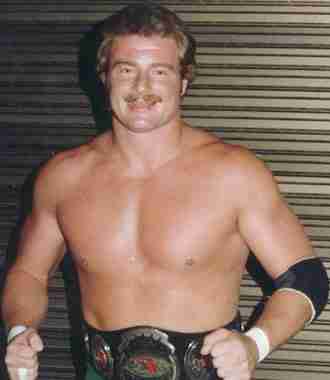 With this expectation of broke athletes, performance enhancing drugs and brain damage due to concussions, we often forget about those who left their sport behind to successfully achieve careers outside the athletic landscape. A lot of them are out there; though too often we choose not to look for them…good news doesn’t sell.
With this expectation of broke athletes, performance enhancing drugs and brain damage due to concussions, we often forget about those who left their sport behind to successfully achieve careers outside the athletic landscape. A lot of them are out there; though too often we choose not to look for them…good news doesn’t sell.Regardless of what your views are on Professional Wrestling, the parallel with former mainstream athletes is unquestionable. In 2008, the Mickey Rourke film, The Wrestler, was praised not only as a motion picture, but by wrestlers for an accurate portrayal of what life was like on the wrestling scene. However, the movie did not show the wrestlers who were able to save their money and find success in other lines of work. Perhaps this is why I sought out former WWF Superstar, B. Brian Blair who not only ascended to great heights in the world’s largest wrestling organization, but did so in the business and political sector as well.
Brian Blair was born in Gary, Indiana and despite the look of a white middle class male that he may have appeared to be embody in the ring, he did not grow up in a rich household by any stretch of the imagination. By the time he was in his mid-teens, he was already on his own, working multiple jobs, yet still attending high school. A natural athlete, Blair played football and was good enough to be recruited by the University of Louisville, where he received a scholarship. Although athletics was his passion, Brian already had a long term vision graduating with a Business and Political Science degree, though before he would implement those skills, the world of wrestling had called.
B. Brian Blair may mostly be known for his days in the then named, World Wrestling Federation, but he had an extensive career for six years in various regional territories before performing exclusively for Vince McMahon Jr.. He had a very good run in the Florida territory of the NWA where he was their Heavyweight Champion twice in the 1980’s. Although the region was not as healthy as it was in the previous decade, it was still one of the most respected in the United States and the championship belt had a lineage dating back to the 1930’s.[2]
Blair joined the World Wrestling Federation in late 1984 at the onset of what was to be a National explosion. After a singles run (highlighted by a series of brilliant matches with “Mr. Wonderful” Paul Orndorff) Blair was paired with “Jumping” Jim Brunzell[3] who had just entered the WWF after departing from the Minneapolis based American Wrestling Association[4].
Dubbed “The Killer Bees” Blair and Brunzell entered the highest profile spots in their careers. Not only was the wrestling business (and the WWF in particular) reaching a stratospheric level, but the mid to late 80’s are arguably the greatest period that the organization had in terms of tag teams. Aside from the Bees, this period featured the innovative British Bulldogs, The Hart Foundation, and Demolition. Even when teams were thrown together, (like the Dream Team and Strike Force[5]) they were presented as valuable entities that performed and acted like they were meant to be together. Tag teams were often the main event of star studded cards that the WWF had in this era, and these matches were often the best on the show.
Although the Bees did not win the Tag Team Championship in the WWF, they left behind a legacy of solid matches in their three and a half year run. Frustrated with the failed promises by management of a Tag Team Title run[6], Blair left the World Wrestling Federation and appeared in various independent promotions and in Japan. Simultaneously, he put his business knowledge to work and became successful as a licensee of Gold’s Gym in Florida, and would later successfully become the County Commissioner in Hillsborough County (also in Florida).
We here at notinhalloffame.com had the opportunity to speak with Brian candidly about his wrestling career, his transition away from it and what he is up to now.
I know that when a lot of people speak with you they want to address you they immediately want to talk about your wrestling career, however I wanted to talk to you first about your post wrestling career. A few years ago, the movie, “The Wrestler” came out and it did not exactly depict wrestlers in the greatest glory. Many of them have fallen on hard times, as have had many past NFL and NBA players. I believe that a study came out that said that over half of former NBA players go bankrupt. You obviously had a plan early on while you were still on top. I am curious if there was a moment in your career that triggered an exit strategy away from wrestling?
“Well, it started very early in life actually. I was about twenty-five years old and I read a book that was called “The Richest Man in Babylon”. The main premise of the story was saving ten percent; basically paying yourself first. It is the same idea as the ten percent to a church or a savings account, just a little more disciplined because you make it your very first bill.
I knew I wanted to something in business and I really wasn’t sure what it would be. I was wrestling and in the gym all the time. I always worked out, I still work out and in talking about that exit strategy, I started looking at the health club industry and I happened to have a friend named Pete Grymkowski who was the majority owner of Gold’s Gym.
I decided to give the Gold’s Gyms a shot. We built one in 1989 and I was actually still wrestling. I had left the WWF, but I still had a deal in Japan. I wound up owning the rights to eight of them and if you dial 1-800-99GOLDS anywhere in the country I developed that whole system. I developed it locally with fourteen clubs and sold it to Gold’s Corporate, and I sold my business when it wasn’t for sale, which is a good thing. I guess the rumour was that Gold’s Gyms was going public and I got a few calls about selling my clubs and that wound up being so in 2000 to the highest bidder. So my exit strategy was successful and I’m grateful that I had that book, because I probably wouldn’t have had enough money. In wrestling it isn’t how much you make, but how much you save. Unfortunately, so many people in the wrestling industry spend $1,000 on $100 show, so to speak as Hank Williams would sing, or maybe Hank Williams Jr.”
I never got past the Tear in my Beer song!
“What’s that?”
Sorry, going for a joke. Not always as funny up here in Canada!
“I love Canada. Mr. T was our manager for a while and when we were in Toronto at Maple Leaf Gardens and I remember selling out the place when I was one of the Killer Bees.”
Actually, I remember being there (Maple Leaf Gardens) when you and Jim (Brunzell) won the Frank Tunney Tag Team Tournament[7].
“Wow”
I remember how you worked four matches on the card, and how the people were still popping for everything that you and Jim did.
“I appreciate that. Those were some fun days. I actually still wrestle. I will be in Atlantic City March 2nd and in Las Vegas April 16th.”
Is that for the Cauliflower Alley Club?
“Yes.”
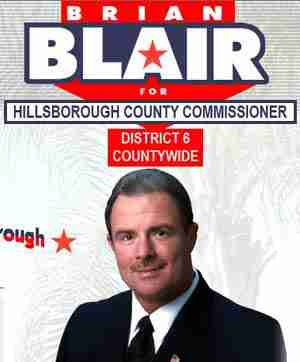 Now your foray into politics; you were a Political Science major right?
Now your foray into politics; you were a Political Science major right?“Yes, I was a Poli-Sci major, and I really started to get into politics when Jesse Ventura and I were together for six months.”
When were you together with Jesse?
“In the Kansas City territiory. We talked about it often.”
So politics was always on your radar?
“I liked politics, but I never thought I would become a politician. Politics as it turned out is way more brutal than wrestling especially if you’re a Conservative. It’s a full contact sport; they try to knock you out. If you don’t do what the newspapers want you to do, especially in Hillsborough County[8], which is a very corrupt county, they will tar and feather you.”
I was going to ask you before, I would have thought that a career in wrestling with all the politics that are involved in that industry that a transition to politics would have been easier.
“Yeah it is. It is far more of a mental beating than the physical one you take in wrestling.”
So you’re happier now being in the business sector as opposed to politics?
“Yes. Yes I am. Although I do miss it sometimes. When I see some of the foolish things from these politicians that don’t have a business background, and that’s what wrong with our nation today”
So do you view yourself more of a Libertarian?
“No, I view myself more as Conservative Libertarian. I do have some fundamental beliefs. I do believe that we should take care of those who can not take care of themselves, but I do believe that we have no obligation to take care of those who will not (take care of themselves)”
Understood. I am curious though, are you known more in Florida for wrestling or politics? I think a lot of wrestling fans are unaware of what happened outside the WWE or the then named WWF, but you had a very good run in the Florida territory where you were a star in were its champion.
“I get recognized probably more as a wrestler.”
Really?
“Yes.”
I would have thought it would have been the other way now.
“I think it’s because where I’m at. When I go to general places, wrestling is always the first thing mentioned.”
Does that bother you, or are you still flattered by the fact that so many fans still remember?
“No. I love the wrestling fans. I always have and I always will.”
I have studied some of the other interviews that you have done and noticed that you mention consistently that Paul Orndorff was one of your favourite opponents. Were there other singles opponents that you had where you felt you had great matches be it in the WWF or other territories that stand out in your mind?
“Ravishing Rick Rude in Florida. Jesse Barr in Florida.”
I actually watched those matches you had with Orndorff and got me wondering how come you never had a singles push in the WWF the same way you had in Florida.
“I don’t know. I did wrestle there (the WWF) as a singles competitor and a lot in Florida. I got a call when I was in Florida to come in to the WWF, and I was hoping to do so as it was becoming the big thing from Hulk Hogan. Hogan gave me a call to bring me in. Terry was also one of the ushers at my wedding along with Paul Orndorff.”
Oh, I didn’t know that!
“Yeah, I’ve never really shared that publically. He (Hogan) was in the AWA with Verne Gagne and he knew Jim Brunzell who was one half of the High Flyers with Greg Gagne. Jimmy had called Terry trying to get away (from the AWA) and Jimmy said he wanted a tag team partner. Terry thought about me for that role and we were put together. We were in Brantford (where the WWF held regular TV Tapings) which was the first time that Jimmy and met up. George Scott was the booker and said we are going tag you guys up and we need to think of something to call you. Now, I was a Miami Dolphins fan back from when they were undefeated in 1972, and they had a Defence called the “Killer Bees” which was based on their last names. George Scott immediately laughed and smiled and said ‘I know Vince is going to like that’. Lanny Poffo happened to be there and ironically he reached out in his bag and pulled out a pair of trunks which were basically like the same ones that we would use for years, with the yellow and black stripes.”
Wait, Poffo just happened to have these trunks on him?
“Yep, he just happened to have them in his bag! Lanny would wear all kinds of different stuff.”
I guess it was just meant to be!
“I guess it was.”
I have also read that in prior interviews that you said Vince McMahon had promised you and Jim the Tag Team Titles on three different occasions. Do you recall when they were?
“Probably six months before Wrestlemania III, and a week after we started teaming we were told we would be Tag Team champs. It kept going on and on.”
So it was basically a ‘don’t worry, we’ll take care of you’ type of deal that was just perpetual.
“Exactly. George Scott who was the booker the whole time, and I thought it would happen. When it became too much, I left but I did not burn a bridge. I don’t believe in doing that. Jimmy stayed. Vince never cared for Jimmy is what I heard and that he had some heat with him.”
Well, based on the way he was booked after you left it sure seemed like it[9].
“Yeah, exactly. Jimmy was real down with Jesse Ventura about forming a union and Vince really got pissed about that.”
Do you think there could ever be a union in wrestling?
“No. When it comes down to it, there are too many people hungry for that top spot. What Vince has done to prevent it, rather than making the wrestlers so big; and I’m not saying that names like The Rock, Hulk Hogan aren’t big names, but he (Vince McMahon) has made the brand the most important name. That makes it more difficult in my opinion for them to unionize. You would have to get eight out of ten people on board, or Vince would just replace them all.”
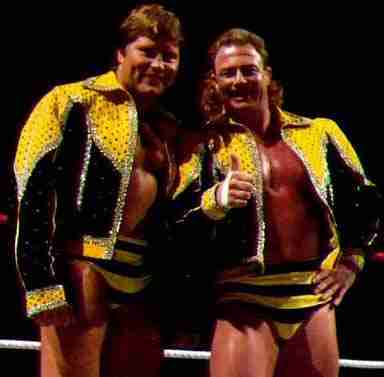 Now, in my opinion, 1987 The Killer Bees had two of their biggest wins in the WWF; that being the Frank Tunney Tag Team Tournament that we talked about in Toronto and being one of the surviving teams at the first Survivor Series[10]. Now on that card, the other survivors were pushed towards other things. Randy Savage who survived his match went on to continue to feud with the Honky Tonk Man over the Intercontinental Title and won the World Title six months later. Andre the Giant winning his Survivor Series Match set up his rematch with Hulk Hogan and even the Jumping Bomb Angels winning the women’s match set them up to win the Ladies Tag Team Title. The four of you (The Killer Bees & The Young Stallions) didn’t have any program of any kind after you won that big match.
Now, in my opinion, 1987 The Killer Bees had two of their biggest wins in the WWF; that being the Frank Tunney Tag Team Tournament that we talked about in Toronto and being one of the surviving teams at the first Survivor Series[10]. Now on that card, the other survivors were pushed towards other things. Randy Savage who survived his match went on to continue to feud with the Honky Tonk Man over the Intercontinental Title and won the World Title six months later. Andre the Giant winning his Survivor Series Match set up his rematch with Hulk Hogan and even the Jumping Bomb Angels winning the women’s match set them up to win the Ladies Tag Team Title. The four of you (The Killer Bees & The Young Stallions) didn’t have any program of any kind after you won that big match. “Right, and it wasn’t long after that I knew it was time to leave. My real strong feeling was that Vince was still pissed (about the union talk). Now, nothing was ever said to me about a union, but I would have been on board, because I do think it would be good for wrestlers to have one. However, I guess the cards were shown too early.”
Going back to that tag team Survivor Series Match, the Tag Team Champs at the time were Strike Force (Martel and Santana) who just won the belts and were wrestling as baby faces. I couldn’t figure out why they had two face teams win, when neither was going to put in a position to chase for the Tag Team belts, unless they were going to do a three chase for the belts which they didn’t do. Also, I don’t believe you even had much of a program with the Islanders who were the last team defeated on the heel team on the match.
“Right, and I admire your recall. The fact that we didn’t get the titles has been questioned by eight out of ten people that I speak with. I can’t think of any other reason why we didn’t get them.”
You were certainly an over team. The people responded to you and Jim, especially with your matches with the Hart Foundation.
“Yeah, our best matches were with the Hart Foundation. Bret Hart said I believe that his best tag team match was with us in Los Angeles and he was referring to I believe the match we had for Saturday Night’s Main Event”.
Yeah, you won that match. Again, that is another curious thing. You beat the Harts right before they won the Tag Team Title over the British Bulldogs, which would in my mind put you as an automatic top contender for the Titles, especially with Dynamite’s injury[11].
“Exactly, and that’s what I thought. That’s from Booking 101 and it makes perfect sense. I don’t think Vince maximized what he could have done with us. Who knows. I can second guess it all day long, but I can’t go back and I can’t change history.”
If I can though, it doesn’t take away from the fans minds what kind of team you were. A couple of years later, the Rockers never won the titles either and they are still held in high regard. In a way it is a bit of an honour as your team is always mentioned as a team that should have won the titles but didn’t. Not every team can say that.[12]
“I guess, you know I’m grateful for every match I had. I’ve lived a life that most people only dream of; belts or no belts.”
Well from football to wrestling to politics, that would be three dreams in one life.
“Yes, it is amazing when I look back and see what I have accomplished, I have so many stories. I believe I am a humble guy, and I try to be as humble as I possibly can. We’ve been to Russia and wined and dined with the crooked politicians there for a week. We’ve had Broadway style shows there; and all of this was from a tour that the Samoans[13] put together. Most people don’t realize what a career I had after the WWF. It may not have been as good as the WWF, but I went to Japan, I went to Malaysia, Singapore, Guam; I went all over the place. I’d have to sit back and look at my passport and see just how many countries I have been to. I counted around thirty when I checked on it one time. I have hung out with George Thorogood in Australia for a week.”
So if you hung out with Thorogood, did you have the bourbon, the scotch or the beer?[14]
“(Laughs) I think we had many of each! It was all a lot of fun. I met Cyndi Lauper, we did that wrestling album. It was all amazing. Hulkster got to know Willie G. Davidson, and I still have the Harley that Willie G. Davidson sold me. We were in L.A. and Willie asked me us if we wanted one at cost. Terry said ‘heck yeah’ and ordered one right away. I said ‘I was saving my money, and that I loved your motorcycles, but what is cost?’ I knew it was still a lot, but I said yes. I became friends with a guy named Tony Carlini[15] who was one of the premiere motorcycle design gurus for fixing them up and customizing them. When I got the bill it was $4,589 and they tricked it out, custom paint job, pipes, chrome and flew it here to a Harley Davidson dealer that has since closed down. I still have the receipt that says ship to T. Bollea. It retails for $10,995. That was a heck of a deal.”
That sounds amazing! I hate asking this, and I am sure you get asked this every day by wrestling fans; The Iron Sheik obviously has a major problem with you, which I can’t for the life of me figure out how it started. It seems like the most random attack. I can’t find one instance on any shoot interview that you ever did where you attack anybody[16]. It has put you in a terrible position, as you can’t psychically attack a man who is close to being crippled.
“Right. Exactly.”
Do you know why it started?
“I don’t know. I think he still had a grudge. We had a shoot where he tried to hook me and hold me down, and I got out and started stretching him and made him tap. He was always supposed to be the toughest shooter.”
Was this on a house card?
“Yeah, I think it was in Hershey, Pennsylvania. You know, most people didn’t really know about it. It just looked like part of the match. Some of the wrestlers knew about it, but that was it. It was kind of like a stroke to his ego, and it was eating at him. There was another instance where we going to Australia and Jim Brunzell and I were sitting next to JYD. It gets dark in the cabin (in the plane) and all of the sudden I smell this funny smell and I look over and JYD had smuggled some crack in the bottom of a popcorn bag, and their (JYD and Sheik) smoking crack on the airplane. I told him what an asshole he was, and I gave him a piece of my mind. That could kill a reputation. I’m sitting next to him; Brunzell’s sitting next to him and we don’t need that kind of stuff. He called me a jabroni or whatever. I never started stuff, but I would never leave something like that alone. We never fought or anything over it. It was just an embarrassing thing for me to have guys that known all over the world smoking crack on the airplane.”
If I remember right, Sheik was arrested with “Hacksaw” Jim Duggan in 1987 for possession while they were feuding[17].
“Yes, that’s right. I remember that.”
I imagine everything must seem a little surreal in a way for you. If you Google your name, the Iron Sheik comes up right away. I would think that has to burn you on some level.
“(Laughs) Yeah, I got to take it and just move forward. I don’t really care for the Sheik. I do feel sorry for him. His daughter died from an overdose, I knew his wife was going to leave him. I knew her in Georgia, and I don’t know how she put up with him. He was an abusive husband. If (Howard) Stern[18] knew things about the Sheik that a lot of people don’t know, he probably would not have had him in on. He is certainly an entertaining person, at least he was. I don’t know what he is doing now. I wish there was a fair way for me to wrestle him.”
Well, you tried to sort of broker peace when you attended the Iron Sheik’s roast. Essentially, it appeared like you tried to be the bigger man.
“Yeah, you’re right.”
I am sure that people might have criticized you for attending the event, but it was also an opportunity to see many of your friends in the business. But again, with his mobility issues, you are stuck in an awful position.[19]
“Is he still walking now?”
I don’t know, but I don’t believe he is moving particularly well.
“I know he’s having problems with his ankle. I would love to have a match with him, where he would be the manager and have an Iranian flag or something, and I would manage somebody. I don’t know, maybe Volkoff could be involved.”
You might be better off with it all in your rear view mirror. It just seems like a situation that you are better off avoiding.
“True. It’s not like it something I pursue, and it’s something I think about every day. I have basically put it behind me. It’s only in front of me when someone puts it in front of me.”
Can I do a bit of word association? I’ll just throw a few names at you of people you worked with in the past, and just say whatever comes to your mind.
“Sure, one word or a story?
Whatever sounds best. If one word sums it up, that’s good. If a story comes to mind, that’s fine too! Whatever you like!
“Ok.”
I’ll start with Nikolai Volkoff.
“(Laughs) Clumsy! But a nice guy.
The Rougeau Brothers.
“Dynamite Kid.”
That’s the first thing that comes to mind with them?
“Yeah, because when they sucker punched him.[20] Brunzell and I were there. That might have ended Dynamite’s career.
Dynamite was the next name I was going to bring up.
“I think of Japan. He was a great worker.”
Davey Boy
“He makes me smile. I wish Davey Boy could see his son Harry now. He was a jokester and a half.”
Ultimate Warrior
“Strange.”
Rick Rude
“Rick Rude was a tremendous worker, even underrated. He was a natural heel. He was very intelligent in some ways. He could keep conversations with people on the street or with kings. The guy had a command with psychology and words. I loved working with Rick Rude.”
Terry Funk
“Classic wrestler in our industry. A gentleman, a friend, probably doesn’t have an enemy in the world. He’s very well respected; everybody respects Terry. He is the nicest person I know to the fans. I emulate Terry as far as the fans go. I take my time and do whatever I can do to make the fans happy.”
Roddy Piper
“ (laughs) Patches.”
Patches?
“It’s kind of an inside story. I was telling him how I grew up and he started calling me ‘Patches’ like that country song that was kind of depressing about all the hard stuff that ‘Patches’ went through. I have to Google it. I don’t even remember all the words to it.”
I’ll have to Google[21] that. I don’t know that song.
“It’s a real tearjerker. Piper was another great guy who I had a lot of fun with. His interviews were so good on the mic that it took away from his actual wrestling skills.”
The Magnificent Muraco
“Oh gosh, Don! Muscles. A long time friend from before I was in the business. I admire him more now that I’ve got to befriend him.”
“One final one, ‘Cowboy’ Bob Orton
“Classic worker. Liked to save his money. He always questioned Vince why he didn’t get the title. He always wanted the World Title. He was just an incredible worker. He was the opposite of Piper. He wasn’t a bad talker, but Orton couldn’t talk like Piper could.”
Well, it’s hard when you are paired with Roddy, it’s got to be impossible to seem like a good mic worker.
“Well, that’s why they put them together. Where Piper couldn’t work, Orton could, and where Orton couldn’t talk, Piper would make it entertaining. Orton could work with a broomstick. I used to watch his dad work. His son, Randy is one of my favourite workers.”
So now you are the head of distribution of Celebritea. Can you tell me a bit about the product?
“Absolutely. Celebritea is an organic bottled tea. It’s considered a new age beverage. Right now, we have four flavors that are just off the charts good. We have Asian Pear, Ginger, Blueberry Acai and Pomegranate Blueberry. They are 80 calories, high in antioxidants, no GMOs, gluten free, and no sugar. If you go to our website, www.drinkcelebritea.com you can see the packaging of the product is really nice and it tastes better than it looks.
“It’s very hard to get distribution unless you’re Coca Cola or Pepsi in the new age beverage category. Nobody wants to be the first one on the block, so I had a challenge. My two partners, Steve Williams and Jeff Stone; I’m a minority shareholder, but even with a great product they couldn’t get distribution. Jeff did all the behind work, and I had the connections and the business savvy so I put a lot of my effort and connections to work and finally get in the Fresh Markets, and we will be going into Publix at the end of the month. It’s a tremendous, refreshing beverage that’s much better for you than a soda. For a couple of bucks it is very enjoyable. A lot of people mix it with vodka.”
Is there anything else you would to direct people too; be it a website or appearances?
“I will be at that Atlantic City show on March 2nd, and appearing at the Cauliflower Alley Club in April. My website is www.brianblair.com.
Thanks Brian!
Interview with Eddy Mansfield
In the mid 1980’s, Wrestling was poised to enter its first boom period since the 50’s. The then named Connecticut based World Wrestling Federation was beginning its push to conquer the United States by signing top talent from other regional territories and running shows across country. Under the ownership of Vince McMahon Jr., the WWF was also expanding its television into markets that under the previous unspoken rules of wrestling promoters were not be crossed. Prior to McMahon, each promoter had their region and running a show outside of that area was frowned upon. This was not the only thing that was changing in the world of professional wrestling.
Interview with Doug Palazzari, The United States Hockey Hall of Fame
Since that time hockey has taken an upswing in America. Granted, it is far from perfect; as it is no longer carried on ESPN and numerous NHL franchises in southern cities struggle to find a fan base in their respective cities. However, there have never been more talented American players than there are now. Internationally, the United States are a serious threat to win any championship they enter; a status that was far from true when they won in Lake Placid.
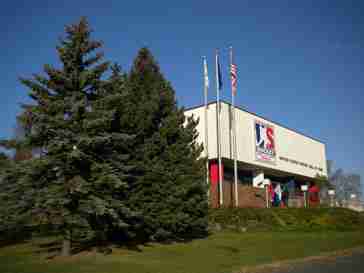 U.S. Hockey has come a long way since the 1980 Winter Olympics, and as such the United States Hockey Hall of Fame has grown along with it. Officially opening in 1973 in the small town of Eveleth in Northeastern Minnesota, the institution has created a place where young Americans who lace up the skates endeavor to finish their career.
U.S. Hockey has come a long way since the 1980 Winter Olympics, and as such the United States Hockey Hall of Fame has grown along with it. Officially opening in 1973 in the small town of Eveleth in Northeastern Minnesota, the institution has created a place where young Americans who lace up the skates endeavor to finish their career. We had the opportunity to chat with the Executive Director of the Hall, Doug Palazzari, who himself was a former seven year NHL player with the St. Louis Blues and is also an inducted member to the U.S. Hockey Hall of Fame. Doug shared with his thoughts on American hockey, its future, and the wonderful institution that he oversees.
The United States Hall of Fame is located in a very small town in Northeastern Minnesota. I know in doing my research that Eveleth appears to be a very appropriate place for the Hall with the history that took place there. Was there any pressure to put it in a larger city, such as Minneapolis, which would still allow it to be in a hockey state like Minnesota?
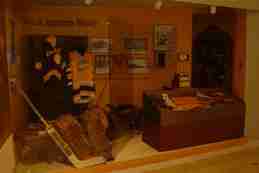 “Back in the late 60’s it was put out around the country for communities to bid on. Eveleth was chosen for a number of reasons, of course being its rich tradition and history in hockey. So many great players came from here, like Sam LoPresti who holds the record for the most saves in a regulation NHL game when he made eighty saves in a 3-2 loss against the Boston Bruins. In goal for Boston that night was Frank Brimsek who was also from here and he won the Vezina two times. In 1938 when the Chicago Black Hawks won the Stanley Cup, their goalie was Mike Karakas who was also from Eveleth. There is so much history here, they have had hockey here since the late 1800’s. Certainly there was great hockey in the East, and in Michigan, but Eveleth was chosen, and I think rightfully so.
“Back in the late 60’s it was put out around the country for communities to bid on. Eveleth was chosen for a number of reasons, of course being its rich tradition and history in hockey. So many great players came from here, like Sam LoPresti who holds the record for the most saves in a regulation NHL game when he made eighty saves in a 3-2 loss against the Boston Bruins. In goal for Boston that night was Frank Brimsek who was also from here and he won the Vezina two times. In 1938 when the Chicago Black Hawks won the Stanley Cup, their goalie was Mike Karakas who was also from Eveleth. There is so much history here, they have had hockey here since the late 1800’s. Certainly there was great hockey in the East, and in Michigan, but Eveleth was chosen, and I think rightfully so.There were issues later on. Some people had the notion that it would be a good idea to move the institution to a larger metropolitan area, however saner minds prevailed. We have a beautiful museum here, particularly in the summer time. We get visitors from all over the United States and Canada, and I think it is the right place. We are doing very well at the moment.”
Do you think that having it in a small town gives it a Cooperstown feel in a way?
“I think there are some things lacking in terms of Cooperstown in that we don’t have the induction ceremony here. However in terms of being a major attraction in a small rural area, yes we are very similar.”
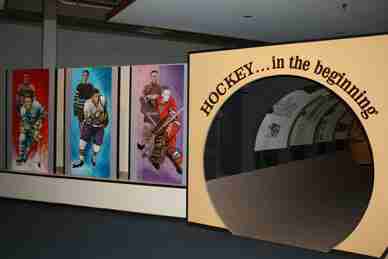 I would like your take on this. I can argue that in the last twenty five years that no other country has improved in Hockey more than the United States; not just internationally in competition but in terms of the high talent they provide to the professional ranks. Granted, they are not on ESPN anymore, but the hockey audience in the States is a loyal one, and it has made some solid inroads in many different communities. With that said, the U.S. is one of five countries (Canada, Russia, Sweden and the Czech Republic) that can legitimately look at any competition and feel that anything other than Gold is a disappointment. How strong are the Hall’s ties to the international game? I sense that is a very strong one. What is the main relationship that you have with U.S. Hockey?
I would like your take on this. I can argue that in the last twenty five years that no other country has improved in Hockey more than the United States; not just internationally in competition but in terms of the high talent they provide to the professional ranks. Granted, they are not on ESPN anymore, but the hockey audience in the States is a loyal one, and it has made some solid inroads in many different communities. With that said, the U.S. is one of five countries (Canada, Russia, Sweden and the Czech Republic) that can legitimately look at any competition and feel that anything other than Gold is a disappointment. How strong are the Hall’s ties to the international game? I sense that is a very strong one. What is the main relationship that you have with U.S. Hockey?“Obviously we are very close with U.S.A. Hockey. At this point they control the induction and the ceremony. They have the committee that chooses those who are going to be enshrined. They were actually instrumental in starting this facility. Of course, our goal here is to make sure that we honor those who are inducted in the best way possible. U.S.A. Hockey is of course the national governing body for the sport, and we are hand in hand with them. The International side is very important, and we are here to sell great American hockey. We have had some wonderful success over the years, and as you said we are certainly competitive on all levels of hockey. We also recognize all the great American players in the past and the corresponding accomplishments. This includes the 1960 Gold Medal and the 1980 Gold Medal Team and the 1998 Women’s Gold Medal Team.”
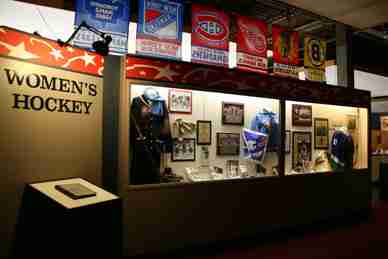 I would like to touch on that last point. I believe your Hall of Fame predated the Hockey Hall of Fame in Toronto by inducting a female by inducting Cammi Granato in 2008.
I would like to touch on that last point. I believe your Hall of Fame predated the Hockey Hall of Fame in Toronto by inducting a female by inducting Cammi Granato in 2008.“I think that was just wonderful. She is a deserving selection for the Hall of Fame. I was very proud of the committee and U.S.A. Hockey with that decision.”
I noticed that your museum puts a lot of focus on the 1980 Olympic Team. Personally speaking, I went to Lake Placid and took my wife to the site of the “Miracle on Ice”. She is an immigrant from a non-hockey playing country and I explained to her the significance of the event, and shortly thereafter the Kurt Russell film, “Miracle” came out. It is story that still resonates thirty two years later. When you are at the museum, you see many children and young adults who were not around in 1980, but are taught the historical importance of the event. Is this something that you can see lasting for generations to come?
“It’s funny how time goes by. Yes, there are kids who come in and aren’t aware of it, but most have some idea, usually from the different movies they have seen. It’s been a long time, but I think it’s going to live on even longer. What Herb Brooks and those young players did was conquer the impossible. Twenty years earlier in Squaw Valley, the team that won there has been forgotten, and that was a great accomplishment as well.”
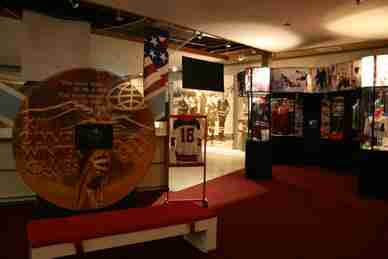 True, but 1960 did not have Al Michaels’ signature call.
True, but 1960 did not have Al Michaels’ signature call.“It doesn’t get any better than that. I don’t think that call will get old to anybody who loves American Hockey.”
Well, not just American Hockey. Who doesn’t like the underdog story?
“I think there was the political climate that played into it too. You’re right, the hockey world is dialed in to that event.”
Where do you see U.S. Hockey in the future?
“I think it is very important to keep growing the game. Our game has grown substantially and many years ago it was a regional sport in Massachusetts, Michigan and Minnesota; but with the expansion of the National Hockey League and the growth of the many Minor Leagues has added a lot of growth in non-traditional hockey markets. It is become very competitive. We are getting talent from all places now. There is a lot of work that still needs to be done and new avenues that need to be explored. We have a great sport but there a lot of options for athletic youngsters in this country. We really need to find a way to make the game more affordable, and with it being such a time consuming activity, it is difficult for families where both parents work, as most households are. I think that these are the issues that have to be addressed for the numbers of young players to improve throughout our country.
We have to improve in non-traditional areas because our growth has been stagnant in our traditional ones. We have to find a way to reach more and more kids. But there is an attitude now in the United States that when we enter a tournament, we are there to win. We are confident that we have the athletes to do that, and that is what our players feel when they put on that USA jersey.”
When someone is selected to the U.S. Hockey Hall of Fame who gives the new inductee the phone call?
“That comes from U.S.A. Hockey. They are completely in charge of the process and the call. They have a committee of fourteen. Anyone can nominate someone who has made significant contributions to the game in the United States, and the committee will review them accordingly. I am glad I am not on that committee as those decisions keep getting tougher will all the great players who will be eligible soon!”
The group that will be inducted this year is a very good class. Mike Modano was a perennial All Star.
“It will get harder and harder to get into the Hall of Fame with all the talent coming up. By that token it shows how far American hockey has come. I do want to say that we recognize International individuals as well. We have the Gretzky Award, which of course he was the first recipient of it. That’s given periodically to the International individuals who have made a major contribution to the growth and advancement of hockey in the United States. This year, Murray Costello will be given that award. Certainly, Murray has an incredible influence not just in Canadian hockey but on International aspects as well. When you look at our American hockey since our inception you see that we have had great Canadian influence in our game. It is a struggle to reach Canada’s level, we don’t feel we are there yet, but we feel we are pretty darn close.”
But at the same time it is not something that you necessarily have to do. It is like the growth of soccer in both your country and mine. Twenty years ago it would seem impossible for the U.S. to win the World Cup. Twenty years from now it seems like it could happen.
“There is no question about it. Every sport wants to convince youngsters that their sport is the best.”
But everything starts at the grass root level. How many young kids in the States looked at the ’80 Olympic team and said I want to be the next Neal Broten, or Jim Craig or Mike Eruzione? And how many young girls a decade ago wanted to be Cammi Granato? Winning is that toxin that just makes everyone want to go the next level.
“Youngsters definitely emulate their role models. One thing that we have to work on is getting more minority participation in hockey. I know we have made strides in those regards, but we need to reach out to those communities with more participation in ice hockey”
Does the U.S. Hockey Hall of Fame have a working relationship with the Hockey Hall of Fame in Toronto?
“We don’t really have a great deal of interaction with the Hall of Fame in Toronto, but we do have a wonderful relationship. Certainly we have great respect for the Hall in Toronto. It is an outstanding tribute to our sport, but we are not competitors. We are two different entities. We are supportive of them and they are supportive of us.”
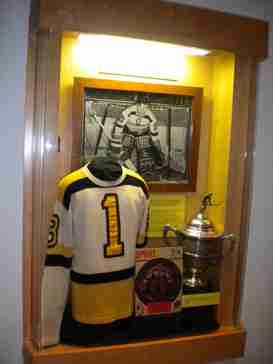 Where do you see the U.S. Hockey Hall of Fame in twenty years?
Where do you see the U.S. Hockey Hall of Fame in twenty years?“You look at different Halls of Fames; the International Ice Hockey Federation has a Hall of Fame, but not a physical structure where people and come and celebrate and remember. Next month we are going to start a new exhibit on the WHA. They (the WHA) have a Hall of Fame, but they don’t have an actual building. We feel that the WHA helped get a lot of Americans exposure to hockey and helped a lot of American players and coaches start their career. We want to do that for them.”
I would go there just to see the old jerseys!
“We have one coming in from the Minnesota Fighting Saints. We will have about four different ones coming in our display. I think also you don’t want to induct someone into the Hall and then forget about them. We want to pay forever a tribute to those who have contributed to American hockey and we want the people to enjoy the history and remember the people and celebrate the heritage that is American Hockey.
Interview with Kamala
Interview with Jerry Kramer
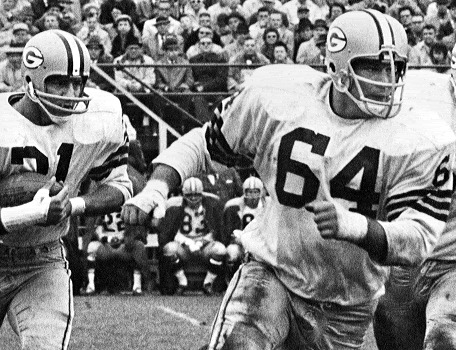 I am not just referring to his vast accomplishments on the gridiron; among which includes five NFL Championships, two Super Bowl Rings, being named to the NFL 50th Anniversary and 1960’s All Decade team and delivering the most famous block in history in the famed “Ice Bowl” against the Dallas Cowboys. It was not just a genuine legend of the game that I spoke too, and the man that we name as the most worthy player who is not yet in the Football Hall of Fame; as that only a snapshot of who Jetty Kramer is.
I am not just referring to his vast accomplishments on the gridiron; among which includes five NFL Championships, two Super Bowl Rings, being named to the NFL 50th Anniversary and 1960’s All Decade team and delivering the most famous block in history in the famed “Ice Bowl” against the Dallas Cowboys. It was not just a genuine legend of the game that I spoke too, and the man that we name as the most worthy player who is not yet in the Football Hall of Fame; as that only a snapshot of who Jetty Kramer is.Gregg Zaun
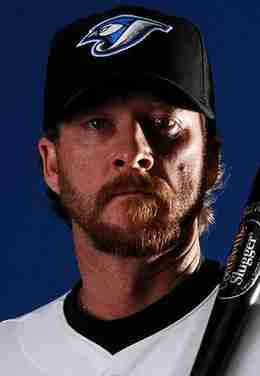 They had an outfield that the Canadian media dubbed the “Best Outfield in Baseball, consisting of 1987 MVP George Bell, Jesse Barfield and Lloyd Moseby. They had one of the top aces of the American League in Dave Stieb and a slick hitting Shortstop in Tony Fernandez. It was a collection of All Stars that gave a city a sporting pride that the national sport of hockey wasn’t able to provide. Despite this collection of talent, for many Jays fan it was a platooning Catcher who was their favorite.
They had an outfield that the Canadian media dubbed the “Best Outfield in Baseball, consisting of 1987 MVP George Bell, Jesse Barfield and Lloyd Moseby. They had one of the top aces of the American League in Dave Stieb and a slick hitting Shortstop in Tony Fernandez. It was a collection of All Stars that gave a city a sporting pride that the national sport of hockey wasn’t able to provide. Despite this collection of talent, for many Jays fan it was a platooning Catcher who was their favorite. Interview with Winston Kelley, Executive Director of the NASCAR Hall of Fame
 Assumptions would be that Halls of Fame would naturally seek to strive in all of those categories, but alas this is not always the case, and certainly not the standard of all of the institutions we discuss on a regular basis. For example, the Hockey Hall of Fame, while striving to be as interactive with visitors as possible, struggles with the limitations of their physical Hall. The Baseball Hall of Fame, while considered to be the most respected Hall of all the sports, has an impressive view of its past, yet lacks focus on its future. The Football Hall of Fame has no interactive component and the WWE Hall of Fame does not even have a physical structure to call its own.
Assumptions would be that Halls of Fame would naturally seek to strive in all of those categories, but alas this is not always the case, and certainly not the standard of all of the institutions we discuss on a regular basis. For example, the Hockey Hall of Fame, while striving to be as interactive with visitors as possible, struggles with the limitations of their physical Hall. The Baseball Hall of Fame, while considered to be the most respected Hall of all the sports, has an impressive view of its past, yet lacks focus on its future. The Football Hall of Fame has no interactive component and the WWE Hall of Fame does not even have a physical structure to call its own. Jimmy Snuka: 29 Years After the Famous Leap
Interview with Marty Jannetty
 Visually, it was easy to make that initial comparison. Both teams came out to Rock and Roll Music (not common in the late 80’s), both were relatively undersized, both had similar ring attire and both featured one wrestler who had blond hair and a teammate with brown. As a fourteen year old teenage boy who was in a stage in life where success with the opposite sex was sadly a mystery, identifying with a pair of good looking twenty-somethings who drew the screams of every girl in the audience (seemingly regardless of age) was difficult.
Visually, it was easy to make that initial comparison. Both teams came out to Rock and Roll Music (not common in the late 80’s), both were relatively undersized, both had similar ring attire and both featured one wrestler who had blond hair and a teammate with brown. As a fourteen year old teenage boy who was in a stage in life where success with the opposite sex was sadly a mystery, identifying with a pair of good looking twenty-somethings who drew the screams of every girl in the audience (seemingly regardless of age) was difficult.Interview with Former WWE Diva, Dawn Marie (Wrestler’s Rescue)
Interviewing professional wrestlers is an enjoyable benefit of running this website. Normally, the excitement would center on questions on their in ring careers and backstage stories. This was not the case when we spoke with former ECW and WWE Diva, Dawn Marie; for although she worked with some of the iconic stars of Extreme Championship Wrestling and performed for two and a half years for Vince McMahon’s World Wrestling Entertainment it was her post wrestling career that we were anxious to discuss with her.
Pete Rose Interview
On August 25, 2011, the New York Yankees made baseball history by becoming the first team to ever hit three grand slam home runs in one game. Many people that day would have heard that future Trivial Pursuit question on the radio or maybe by watching Sportscenter. On that day, I got that information from the person sitting next to me who received the news over his I-Phone. The person who shared the news of the Yankees accomplishment with the exuberance of a ten year old boy who had just gone to the see his first Major League Game. That person was the man who has more hits than anyone else in Baseball history, Pete Rose.
Interview with Tyson Nash; Former NHL Player, and Current Color Commentator with the Phoenix Coyotes
I remember as a kid pouring through the statistics on the back of hockey cards. They were fairly simple back then as there were no numbers beyond Games Played, Goals, Assists, Point and Penalty Minutes to look at. They say that numbers never lie, but numbers never tell the whole story. It was natural to look at those with the high points tallies from the year before, or the twenty year veteran whose annual stats were printed so small that even eight year old eyes had to squint to see them. Each one of those players I studied for hours on that 1980-81 O-Pee Chee set took different paths to the National Hockey League and each athlete took on different roles to excel there. A generation later, a new era of statistical analysis has emerged. Constant exposure to media has pulled back the curtain of traditional numbers and appreciation of players who could do the little things that could help win games emerged. We here had notinhalloffame had the pleasure of speaking with Tyson Nash; one of those unsung heroes whose career cannot be judged by a quick look at a hockey card.
Interview with Alicia Kramer (Daughter of Football Legend Jerry Kramer) speaks to us about her campaign to get her father in the Football Hall of Fame.
Every day at our website we debate those who we feel should be considered for potential Hall of Fame induction in their respective fields. With the vast majority of names we list, cases could be made against those enshrinements. With Jerry Kramer, the number one selection on our second annual football list, we feel strongly that there is no argument against his place in Canton.
Chavo Guerrero Sr.
It is virtually impossible to watch WWE programming without seeing a second (or even third) generation performer. As of this writing, thirteen members of the current roster have a parent who competed as a professional wrestler, and there is a lot of indication that this number will grow. Florida Championship Wrestling (the training ground for the WWE) has many more second generation sports entertainers waiting to continue the legacies put forth by their parents.
Nash the Slash
Regular followers of our website know that one of our regular themes is challenging just what the actual definition of Rock and Roll is. It is one thing for us to discuss this topic, but quite the other to actually do it. Recently, we had the pleasure of interviewing Nash the Slash, who despite eschewing conventional Rock wisdom managed to become an International star.


